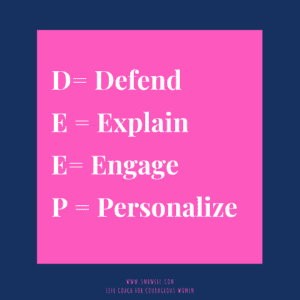Podcast: Play in new window | Download
Subscribe: Apple Podcasts | Spotify | Amazon Music | RSS | More
How To Disarm A Narcissist
Once you know you’re dealing with a narcissist, the next step is learning how to disarm a narcissist. I have been in relationship with these types of people and know it affects your mental health, emotional health, and confidence. If you ever ask yourself “Am I crazy?” or if you’re the only on in the relationship working on your self, these tools are for you! These tools also work with people who are emotionally immature or who have narcissistic traits.
If you are in and physically abusive relationship where you fear your or your kids safety, please get professional help before trying these tools or listening to this podcast. These tools are hugely effective because they disarm the narcissist, yet, if you’re in a vulnerable situation, things can get dangerous quickly and should not be tried on your own. Email me and I can help you get support in a 100% confidential way.
Further, these tools are simple yet not easy. Get a coach or get in a group like my monthly membership to make sure you’re surrounded by people who support you and don’t add to the confusion these types of relationships create. When you start to use these tools with narcissists, They will react. They will try to get back in the control seat, they will be very unsettled with your change of behavior. Having a coach or a group to reinforce that you are not doing anything wrong is super important.
Top Tools to Disarm a Narcissist
1. Grey Rock:
Think of a grey rock. Dull. Boring. You Walk right by it, right? In interactions with this type of person, you want to become a grey rock. If they criticize you, shrug your shoulders. If they tell you your decision is dumb, ignore them. Normal social rules don’t apply. You do not need to be kind. They feed on your kindness. Likewise, you don’t need to be rude. They feed on your rudeness too because they see they got you to react. You get to be a grey rock. Boring. Dull. Non reactive.
2. Don’t go DEEP in conversation
When in conversations (text, email, phone, or in person), do not go deep. Deep stands for defend, engage, explain, personalize.
Do not defend yourself or your actions. Don’t engage. Do not explain your actions. What would be your point? They will not see your point of view. They will not understand. Further, defending yourself steals your energy. It’s a sign for them that you’re not a grey rock. That they still have a hold on you. That you care in some way about what they think. It gives them back their power.
Finally, please don’t take their actions personally. Their actions are about them. These types of people are deeply wounded who are rarely capable of change or inner reflection. It is not up to you to explain your point of view or defend or engage. When you do that, you have an expectation that they think similarly to you. They do not. Save your energy and don’t try to use reason with people committed to their version of reality.
3. BIFF:
Sometimes you do need to interact with this type of person, whether it’s a coworker, a family member, or the parent of your children. In this case, BIFF is your tool. BIFF stands for: Brief, Informative, Formal, Firm. It is the opposite of defending, excuse making, wordiness or explaining. The more concise and informative the better. Here are some examples of emails or texts written in this way:
- Dad, I will not be coming to your house for your birthday celebration this weekend.
- Frank, I am making summer vacation plans. Please tell me by Sunday at noon if you have a preference as to which month I take the kids out of town.
- Sarah, here is the brief you requested. If you want any edits done, please let me know by noon on Thursday.
Whether you’re writing to a parent, an ex, or a coworker, you can save a lot of your energy by being brief, informative, formal and firm. Give the details not the excuses.
4. Broken Record:
Along these lines, sometimes you may be in a situation where you choose to speak in person to this person. While I don’t recommend interacting in this way, it absolutely can be done with mindful intention involving these two steps:
Let’s use an example of telling your mom or mother in law that you won’t be hosting Thanksgiving this year.
- Get clear on your intent. Your intent is to tell your mom you won’t be hosting Thanksgiving this year. It’s not to get her to agree that it’s a good decision or to explain your reasons why you won’t be hosting. Your intent is to convey the information. To tell her.
- Choose a Broken Record Phrase and pre-rehearse it. A broken record phrase is a clear, concise, brief message. I like pre-rehearsing in front of a mirror.
“Mom, we’ve decided not to host Thanksgiving this year.”
This is your broken record phrase. Think of a broken record. You want to say this back to her when you’re talking to her. Expect resistance. Assume that she will talk back.
We get into trouble when we think these people will act differently than they always have, or that they’ll act how we’d act. nope. Expect her push back and when she does, repeat your broken record phrase. Don’t add to it. Remember, there’s no need to explain, defend, or engage. Be a broken record.
Ready, Set, Action
These are brief and quick overviews of highly effective tools. Listening to a podcast is a start. Scheduling a coaching session or joining a group coaching program is a magical action step. We need encouragement and support to break patterns in these long standing relationships. If you have children over the age of 10, take my Parenting Teens Survival Course so you model and reinforce healthy relational interactions.
If you’re not in this sort of relationship but know someone who is, please be the best kind of friend there is and don’t “should” on them. Don’t tell them they “should” reach out to their mom because she’s their mom. Further, please don’t tell them that they “should” be more patient or that they “should” stay in contact with someone because they’re family or for any other type of reason.
These relationships are deeply wounding to our emotional health and, as I unfortunately discovered, our physical health as well. You may not understand how a parent or husband can treat your friend like that, though you don’t need to. Use the knowledge from this podcast and my work to support your friend in breaking these deep, toxic patterns. Thank you.
Resources Mentioned
Susie’s Recommended Books on Relationships on Amazon
Susie’s Recommended Books on Divorce and Toxic Relationships
Divorce Abuse Specialist Interview on YouTube
Subscribe to the Love Your Life Show
Find Support Here
See if the LOVE YOUR LIFE SCHOOL is open for enrollment here
GET HELP: Schedule a coaching session with Susie
Change the future! Take the Parenting Survival Course Here







